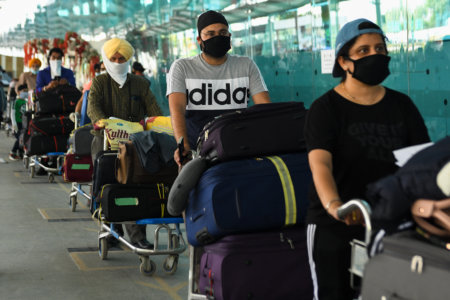
International students in Australia need to be more wary of scam alerts, especially those related to agents.
A criminal network operating within the country allegedly employs migration and education agents to bring “non-genuine” students to Australia, according to a leaked government review.
Some of these “non-genuine” students ended up working in the sex industry.
Local newspaper The Age reports that some sex workers have paid agents to help them enter Australia, while others may have been trafficked.
This raised concerns that last year’s lifting of the 40-hour fortnightly limit on working as an international student in Australia could have driven exploitation.
The working hour limit is set to be capped once again from June 30, 2023, PIE News reported.
The Nixon report, which has not yet been released, has called on the Albanese government to consider regulating onshore and offshore agents.
The report also found the students enrolled in private vocational colleges owned by members of the criminal network. It allowed them to cover up non-attendance by those on student visas.

Former Victoria state police commissioner Christine Nixon (pictured on the left) conducted the inquiry when directed by Home Affairs Minister Clare O’Neil. Source: William West/AFP
Scam alerts for international students in Australia: Clamping down on “dodgy” agents and providers
Parliamentary hearings focused on Australia’s international education sector are set to resume, with a session on May 15 discussing the practicalities of agent regulation.
“The current approach, which has been years long of letting providers oversee agents, has comprehensively failed,” said Julian Hill, MP and member of the Joint Standing Committee on Foreign Affairs, Defence, and Trade.
“These stories just keep coming up; students are being exploited, particularly at the bottom end. We’ve got to break this business model of dodgy agents and dodgy providers exploiting people.”
Hill’s speech is a reminder of how these schemes have evolved and become more complicated.
Let’s dive deeper into some incidents that have occurred in popular study-abroad destinations:
Top scams alerts for international students in 2023
1. Canada
Not all good promises touted with a foreign education are true: it could be a one-way ticket to a nightmare in an unfamiliar place.
That is the reality of many exploited students who are victims of the Punjab-to-Canada recruitment business, whose hopes and sacrifices are dashed for others’ profits.
Reports from multiple Canadian media sources have highlighted the ignored plight of Punjabi students who arrive in the country.
With unchecked agencies overseas flourishing to fill the coffers of international recruitment, international students are paying the price.
Rural Punjab has become a hot market for recruiters to line their pockets through commission, according to an exposé about the seedy reality of international student recruitment to Canada by The Walrus in 2021.
This includes pushing students toward certain colleges and universities and giving false information about tuition fees.
Most of the students from Punjab fit a certain profile: young and educated working-class hopefuls who seek greater opportunities in the wider world.
With the study-and-immigrate route dangled in front of them, agents could easily convince this group of students that what would usually take years of hard work and an even longer wait would seem like a breeze.
By the time these students realise the gravity of their situation in Canada, there is no way back — they are forced by their situation to take up menial jobs where they are vulnerable to mistreatment.

Don’t miss out on scam alerts, as you could be part of the victims who lost at least 11.8 million Australian dollars to COVID-19 scams. Source: Ishara S. Kodikara/AFP
2. Australia
In 2020, the Australian Competition and Consumer Commission (ACCC) recorded 32,200 threat-based COVID-19 scams.
Victims have lost close to 12 million Australian dollars, which calls for greater vigilance among vulnerable groups in Australia.
Of the recorded incidents between January and October 2020, 74% were linked to Chinese authorities.
International students in Australia, particularly those from China, have received calls from individuals who were impersonating police, embassy, or government officials.
They would claim to have evidence that students are involved in illegal activities or face visa issues — which they can only get out of if they pay a “fine.”
Virtual kidnapping schemes are also targeting international students in Australia.
It starts with a similar claim of criminal activity. Then, students are forced to send photos or videos of themselves bound and blindfolded.
They are used to bully a ransom out of their families back in China.
In some cases, suspicious callers may claim to be the Chinese government tracking all Chinese citizens abroad during the pandemic.
They would request personal information for a “health check,” which they may use to further a scam or steal a student’s identity.

In cities where the demand is high to find suitable accommodation, such as London, that’s a red flag and scam alert to be extra careful when dealing with rental agents. Source: Daniel Leal/AFP
3. UK
Rental scams have become rampant among students booking accommodation in big cities, such as London or Manchester, where there’s stiff competition for student housing.
They are more likely to succumb to shady deals when the entire process of securing a place happens online.
These incidents occur when someone tries to sell a fake room or apartment to a student.
More than 5,000 people were victims of rental fraud between November 2020 and December 2021, according to the national police unit Action Fraud.
Most international students don’t report these incidents to the police or concerned authorities, says Prajwal Ikhar, co-founder of Home Lodgers.
What’s more, most victims are young students who are unaware of the local rules. In 2022, there was a 50% rise in rental scam victims among students who are below the age of 25, Ireland’s National Police reported.
There are tell-tale signs that students need to be aware of, namely:
- Hijacked advertisement: Copies of the legitimate advertisement are made, but some details, such as the price or the property’s location, will be altered. Then, students will be contacted and offered to rent a room in this fake accommodation.
- Clickbait advertisement: Students will be contacted about an apartment that doesn’t exist and receive false promises on easy rental payments, discounts, and more. They may never see it again once they deposit money into the purported landlord or agent account.
- Self-promotion: These online ads typically mention that the advertiser is ultra-rich and looking for student rentals.

International students at all countries and at all levels should pay attention to scam alerts. Source: Scott Olson/Getty Images North America/Getty Images/AFP
4. US
A community college senior in California lost thousands of dollars when he tried applying for a job. Posing as an employer, one scammer hired this student to write financial reports and perform electronic cash transfers.
First, he was told to provide his bank account information, as he was to receive cash (via Zelle) and turn it into Bitcoin. He then received a couple of cash deposits and returned them in Bitcoin.
However, money was never actually deposited into his account; instead, he had lost US$7,319 of his own money, which he inadvertently gave away in Bitcoin.
In North Carolina, the Better Business Bureau has warned college students to be on high alert for suspicious emails from their school’s “financial department.”
If you received an email about a COVID-19 stimulus check, be warned that this could be a phishing attempt.
You risk giving up your username, password, or other personal information by clicking the link. To make matters worse, you could also unknowingly download malware onto your device.
Recently, Student and Exchange Visitor Program (SEVP) and Homeland Security Investigations (HSI) phone numbers have been used to target international students in the US.
This was confirmed in a news alert from the Officer of International Affairs at The Ohio State University on June 7, as reported in its school paper, The Lantern.

Pay attention to scam alerts so you don’t fall for an AI-powered scheme. Source: Richard A. Brooks/AFP
Scam alert: AI is catching more victims off guard
In a post-COVID-19 world, scammers are beginning to double down on technology based scams.
Some have posed IDP and British Council representatives continue to flood social media with adverts for fake IELTS certificates.
Today, generative artificial intelligence (AI) is at the forefront of a new technological wave.
Take ChatGPT, for example.
A Twitter user reportedly used the chatbot to take an SAT exam.
At the University of Minnesota and the University of Pennsylvania’s Wharton School of Business, professors shared that the chatbot passed law exams and another exam at the business school, CNN Business reports.
Unfortunately, this tech has been abused to lure victims to nefarious schemes too.
Jennifer DeStefano experienced this when she received an unknown call. For a moment, she contemplated not picking up, but her oldest daughter, 15-year-old Brianna, was away training for a ski race.
The mother feared it could be a medical emergency. Instantly, she was greeted by yelling and sobbing.
“The voice sounded just like Brie’s, the inflexion, everything,” she told CNN. “Then, all of a sudden, I heard a man say, ‘Lay down, put your head back.’ I’m thinking she’s being gurnied off the mountain, which is common in skiing. So I started to panic.”
In northern China, Reuters reports of a fraud that used sophisticated “deep fake” technology to convince a man to transfer money to a supposed friend.










